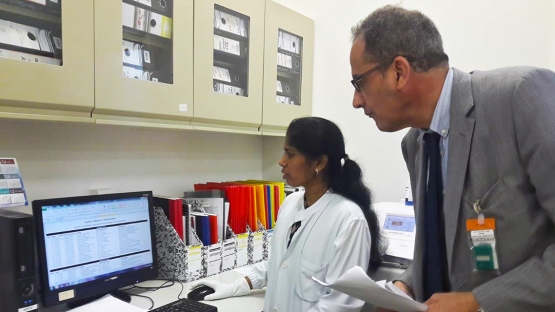A team of international experts recommended strengthening diagnostic facilities at two major hospitals in Mauritius in order to improve the country’s cancer diagnostics services.
This was one of the conclusions of an IAEA 'imPACT Review' conducted upon the request of the Mauritian Ministry of Health in December to analyse the country’s cancer control capacities and needs. The experts noted that cancer diagnostic capacities could be improved by upgrading imaging equipment at Victoria Hospital in Quatre Bornes, as well as the nuclear medicine services at J. Nehru Hospital in Rose Belle.
While Mauritius is already in a position to provide a number of advanced cancer services to patients, the Minister of Health and Quality of Life, Anwar Husnoo, told the Review’s experts that they are now working towards strengthening the capacities of health professionals in line with current and expected improvements in cancer care and on the development of a national cancer control programme.
“It is important that we have adequate capacity in cancer centres to ensure services remain fully effective. Not just now, but also into the future as the number of patients grows and technology advances,” said Husnoo. “We are working with our partners to make sure that we continue to provide the best cancer care we can.”
According to the International Agency for Research on Cancer (IARC), breast cancer constitutes almost a quarter of all new cancer cases in the country. Overall, the cancer burden is increasing: by 2030, the number of Mauritians developing the disease each year is expected to rise by a third.
The purpose of the expert Review is to provide an evidence-based analysis and series of priority recommendations in each area of cancer control to assist the government in making informed decisions.
As part of the Review, experts nominated by the IAEA, the World Health Organization (WHO) and IARC met with senior representatives of public and private health facilities which provide cancer services in the cities of Port Louis and Quatre Bornes, and the districts of Pamplemousse, Black River, Grand Port and Mahebourg. The experts reviewed cancer control capacities for planning, registration and surveillance, prevention and early detection, treatment and palliative care; as well as radiation safety and security of radioactive sources.
In addition to the recommendation to improve diagnostic services, others included the expansion of cancer treatment modalities and the upgrading of radiotherapy capacities and regulations on exposure control.
Prebo Barango, from WHO’s Regional Office for Africa and a member of the expert team, highlighted that “WHO will continue providing support to Mauritius in tackling non-communicable diseases and strengthening cancer care. WHO also stands ready to support strengthening the national cancer control programme in light of the mission outcomes.” According to WHO, cancer represents 12% of all deaths in the country.
The IAEA has provided technical cooperation assistance to Mauritius since 1976 and is currently supporting the enhancement of national capacities for the management of cancer.
Of the 96 imPACT Reviews conducted by the IAEA's Programme of Action for Cancer Therapy since 2005, this was the 39th Review in Africa.




